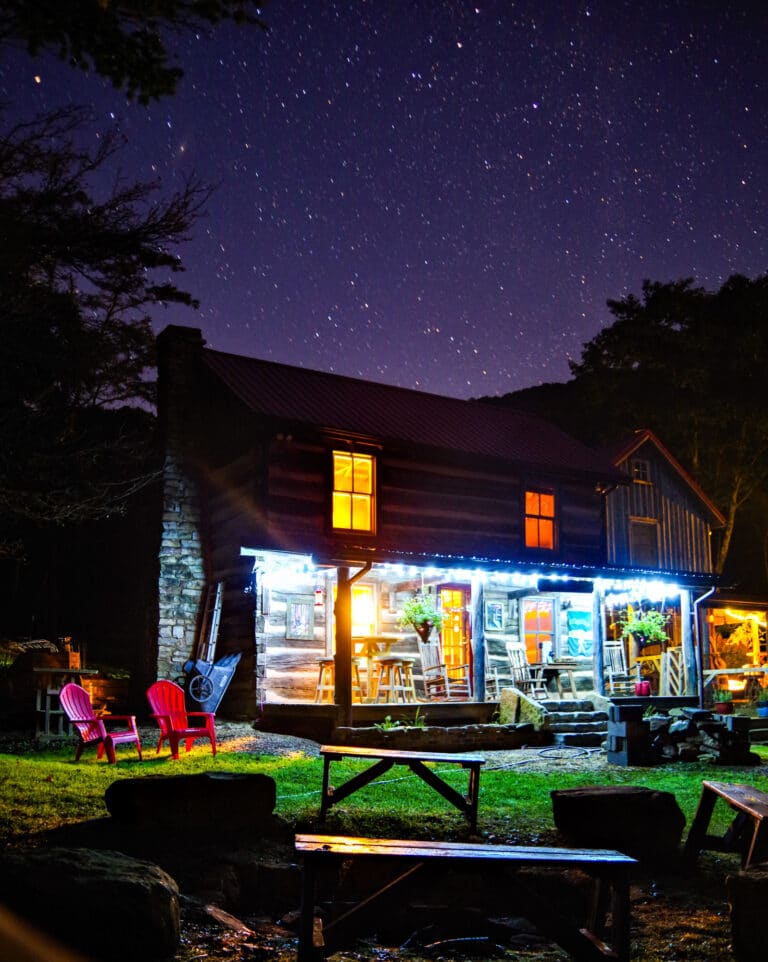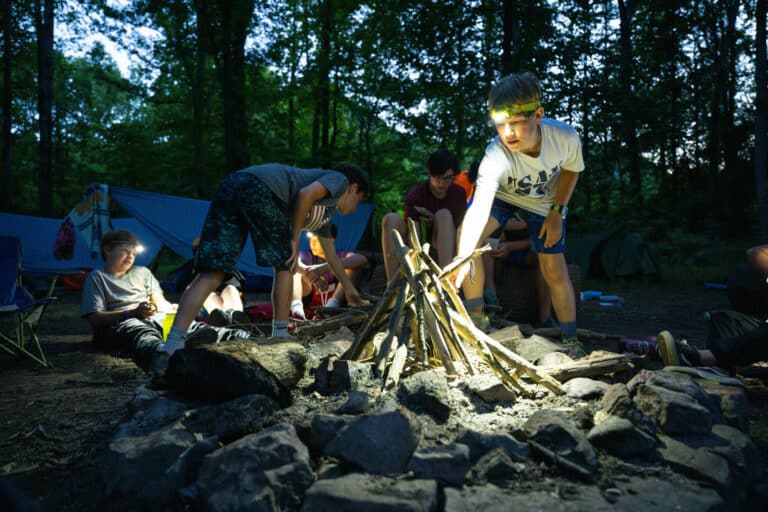Appalachian Ecotherapy and Why We Need it Now
Click here to read the whole article
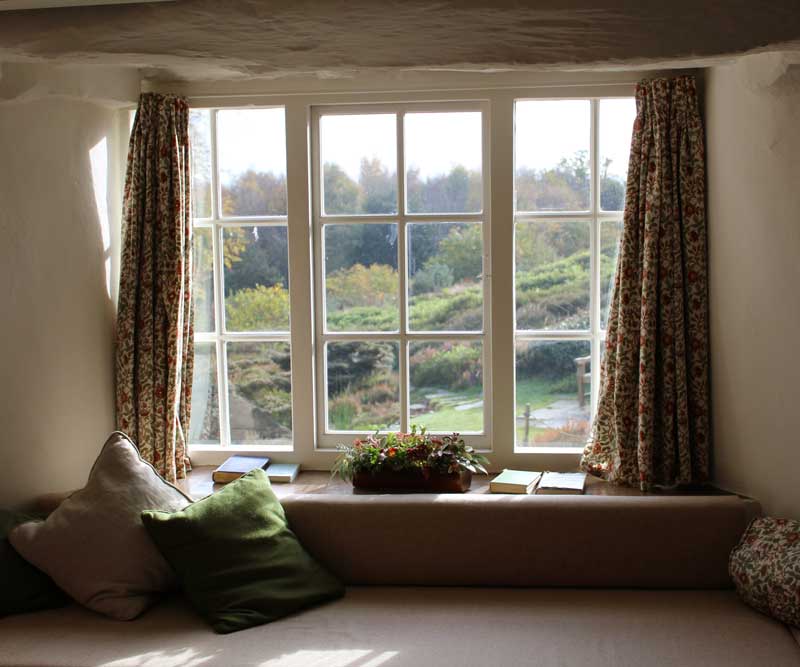
Part 2: Why We Need Ecotherapy
As I sit here pecking at my keyboard in the darkness of my basement apartment, F.lux dims my computer monitor and transitions to a warm, yellowish glow. Every evening when the sun goes down, the app faithfully changes the color temperature of my display to reduce white-blue light, an all-too-common detractor of good sleep in a world full of screens. Though I admit it’s a clever piece of technology, it occurs to me that I’ve just been informed of the setting sun by a computer application.
It wasn’t always like this. In fact, it was almost always not like this. Back in Lucy’s time about three and half million years ago, our bipedal ancestors took great heed of the dark and the predators that came with it. The setting sun was final call to get to shelter, bed down, and conserve energy for a new day. Understanding this cue from nature was vital to the survival of our forebears, and they certainly didn’t need an app to send that message home.
—
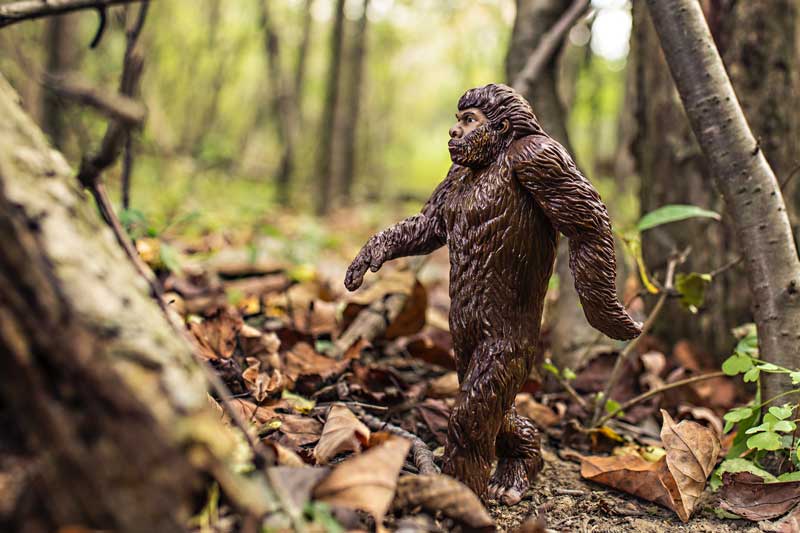
A Brief Lesson in Human History
Much has changed since Lucy, both for the world and for us. But one of these has changed much faster than the other. We stood on two legs four million years ago and the first homo sapiens walked the earth at least 300,000 years ago. 10,000 years ago we developed agriculture. And only 200 years ago did we have the first industrial machines. Digital technology emerged in the last 70 years, and it’s only been a decade since humans became predominantly urban rather than rural species.
Now that’s a lot of zeros flying around, and it’s hard for me to wrap my head around millions of years, so let’s scale it down. If the span of human history were only 400 years long rather than four million, we’ve spent 399 of those hunting and gathering. Agriculture came about within the last year, we’ve had machines for about a week, digital technology for two and a half days, and we’ve been city dwellers for nine minutes. In other words, 99% of our time on this earth has required a very different lifestyle than the one we live today.
For the vast majority of human history, we’ve been keenly aware that we are at nature’s mercy. Its bounty and destruction drew life’s boundaries and we had to color inside its lines. Violent storms, razor-toothed predators, pestilence, and drought were high stakes. Good harvest, dry shelter, plentiful game, and clean water were high stakes. While these facts remain true today and always will, it feels like our awareness isn’t quite as keen and the stakes aren’t quite as high.
Hell, I can order my groceries online. Not only is my food processed, packaged, and presented in a temperature-controlled, well-lit environment, I no longer need to bother with the saga of actually shopping for it. Okay, so we might not be hunter-gatherers anymore. But you can’t visit a Walmart on Black Friday or watch someone in the produce section thumping on a cantaloupe and tell me that humans don’t still scavenge, hunt, compete, and gather in our own weird ways. But that’s no longer any need either — an hour of scrolling from the comfort of your recliner will provide sustenance for a week. Truly amazing.

I don’t want to confuse my amusement for derision, however. Romanticizing the life of an Ice Age caveman would be an exercise in futility, besides a little silly. I am thankful for technology and the fact that it’s here to stay. It yields profound possibilities: food security, clean water, modern medicine, accessible information, civil engineering, global communication. The ability to poop while sitting on a ceramic chair. It’s probably fair to say that life is easier and more comfortable than it used to be. But the sword of human innovation has a sharp double-edge.
The Changing American Life
With globalization, outsourcing of labor, and changes in technology, the landscape of American life is pretty different that it used to be. In the 1800s, 90% of the U.S. population lived on farms. They made shelter from sod, rose with the sun, tilled soil, planted seeds, irrigated the land, and cultivated crops by way of literal horsepower and handheld tools. The harvest determined one’s financial and actual survival. Life was constant negotiation with nature.
Today only 2% of the population makes a living from farming, and they do it with a lot of help from powerful machines. Jobs and people have moved to cities, which generally discourage interaction with the natural world. According to the Pew Research Center, employment opportunities now require more social and analytical skills opposed to physical skills. That is, interpersonal skills, critical thinking, writing, and communication skills are in greatest demand. Of course, jobs that require these skills are mostly indoors.
When we’re not working or sleeping, most of the remaining time is spent on leisure — another fast-changing piece of American life. While recreation used to revolve around unstructured outdoor play, hunting, fishing, camping, and athletics, the popularity of these activities has either stagnated or declined. According to the Nielsen Company Audience report, Americans now spend more than 11 hours per day in front of a screen, a figure unsurprising when we consider how integral information technology has become. Whether it’s finding a place to eat, settling a debate, playing games, getting directions, taking photos, scheduling, setting alarms, listening to music, or finding your future spouse — there’s an app for that.
But these technological solutions bring about new problems, and our vocabulary has expanded to include phrases we never knew we’d need. Ever experienced separation anxiety from your phone? That’s nomophobia. If you’ve ever felt jilted by a partner and jealous of a screen, that’s technoference. Was the vibration from your pocket entirely a figment of your imagination? Phantom phone syndrome. If you’ve ever diagnosed a skin tag on WebMD and convinced yourself of imminent death, that’s cyberchondria. I’ve experienced all of these at least once, and I suspect I am not alone. And for all of you on WedMD right now, channel your inner Arnold and repeat after me: it’s NOT a tumor.
We’ve become so enmeshed with our technology we’d rather commit to a relationship with our devices over of a relationship with ourselves, other people, and nature. Communicating digitally can superficially satisfy the desire for social interaction without even needing to leave the house. Entertainment is available from the push of a button in your living room. And every product is designed to entice and to addict, making it difficult to peel away and do something else.
This changing world comes at a cost to our children as well. Nature has been shown to promote intellectual, emotional, and social development in children, but they are spending less time outside. Parents and schools have increasingly discouraged unstructured outdoor play, fearful of the dangers from traffic, malicious strangers, and from nature itself. Even children’s vocabulary has begun to change, with the most recent Oxford Junior Dictionary scrapping words like beaver, dandelion, otter, acorn, and ivy in favor of more modern words like blog, broadband, and voicemail. M stands for MP3, not magpie.
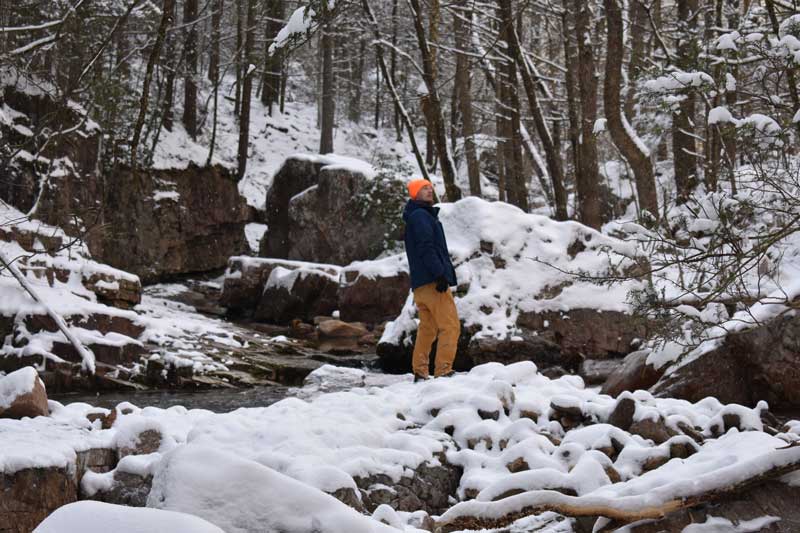
This is particularly problematic when you consider the fact that our climate is changing in dangerous ways — rising global temperature, warming oceans, melting glaciers, sea-level rise, extreme weather events, ocean acidification — and our children are the policy-makers of tomorrow. Canadian conservationist Robert Bateman remarked, “If you can’t name things, how can you love them? And if you don’t love them, then you’re not going to care a hoot about protecting them or voting for issues that would protect them.”
Combine these elements and it’s easy to see why nature has taken a backseat. The average American does not feed himself directly from the land, lives in a concrete jungle, works within the shelter of walls and cubicles, and decompresses by vegging out in front of the computer or television. Our children are learning from our example, and are beginning to see the natural world as a threatening place. Engagement with nature is now viewed as a dispensable recreational and aesthetic amenity. It’s nice, but it’s not at the top of most people’s priority list.
Unfortunately, the earth doesn’t give a damn about our priorities. Whether we like it or not, the health of the planet is directly tied to our own — air pollution causes respiratory disease, heavy metals cause neurotoxicity, global climate change is likely to fuel the spread of infectious diseases. A healthy planet makes for healthy humans. But beyond basic survival of the species, evidence shows that personal connection and engagement with nature is critical for individual wellbeing and happiness. Full consequences yet untold, the longstanding relationship between humans and the natural world has become heartbreakingly estranged. But let’s refuse to let that be the end of the story.
Ecotherapy: A Revolutionary Movement
As I’ve illustrated, humans are prone to revolution. The Agricultural Revolution, the Industrial Revolution, the Digital Revolution, and the Information Revolution each catapulted humans to new heights of progress and change. This progress has come with its share of painful repercussions, but the fact remains: we are a revolutionary species. And while our penchant for aggressive problem-solving is partially to blame for why we’ve gotten into this mess, it’s also the way we will get out.
Thankfully, this problem isn’t as new as you might think. People have distrusted our increasing alienation from nature for a long time. Lord Byron wrote, “There is pleasure in the pathless woods, there is rapture in the lonely shore, there is society where none intrudes, by the deep sea, and music in its roar; I love not Man the less, but Nature more.”
Though the idea of reconnection to nature was originally championed by artists and writers, scientists eventually joined the bandwagon. In 1984, Roger Ulrich studied hospital patients after surgery and discovered that people assigned to rooms with a window view of a natural setting had shorter post-operative stays and requested fewer painkillers. That initial study gave a modicum of credence to what many people have intuitively known for years: nature is good for us.
From there, the field of ecopsychology truly took off. A cohesive definition of ecopsychology is a bit hard to pin down, since it is not only an academic discipline of study — it’s a little bit of biology, ecology, psychology, art, philosophy, environmentalism, and even a touch of the spiritual all mixed into one. Connecting them is the underlying desire to understand and revitalize the relationship between human beings and the natural world.
Ecotherapy is where theory meets application — communing with nature to heal. This covers a huge range of activities from listening to nature sounds on your headphones to volunteering and eco-activism to month-long wilderness therapy programs in the remote backcountry. Still a nascent field, it is unrestricted by official licensing boards and brings a diverse group of people with equally diverse practices. It can mean structured interventions with a therapist or activities practiced individually.
The field is beginning to gain traction and respect, particularly on the West Coast. Medical doctors have started prescribing time in the park, the Japanese practice of “forest-bathing” has entered the mainstream, and mental health practitioners are incorporating powerful therapeutic interventions to address depression, anxiety, ADHD, trauma and more. But perhaps most importantly, ecotherapy is challenging people to change their perspective about our relationship with nature — for ourselves, and for the good of the planet.
It can be depressing to think about the damage humans have done to the planet and to think about where we are headed. But in my search for knowledge, I found others who still believe that we can change. I found solidarity to push back against apathy. Humans are defiant, and that is where my hope lies. When our ancestors harnessed the power of fire over a million years ago, our collective credo was born: the dark may frighten us, but it will not win.
—
Living in the heart of Appalachia has been a blessing. Though I’ve climbed these old, blue hills again and again, I’ve never lost my reverence for their magic. They have granted me my best memories and carried some of my heaviest burdens. Though ecotherapy is less common on the East Coast, I knew there must be researchers and healers in the Blue Ridge who recognized the potential in channeling the beauty of this place we call home.
On my journey I met with some old colleagues, therapists, academic researchers, entrepreneurs, activists, artists, parents, and trauma survivors to learn more about this growing field. I wanted to know their experiences and thoughts about why nature is such a powerful healer and how we can use these concepts in our daily lives.
I’ve learned more than I can possibly cover in this short series, but most importantly that a stronger relationship with nature is good for everyone, everywhere. Regardless of how old you are, what you do for work, where you live, whether or not you have a disability, or your level of income — reconnecting to nature is healing and possible, the consequences of which have a ripple effect through our lives, the lives of others, and the living things on the earth.
Ecotherapy is one of those words that we didn’t know we’d need. It reminds us that we are not actually separate from nature, and that it’s time to check back in. Though I consider myself an avid lover of the outdoors, there are times when I forget that I haven’t gone outside for a few days. There are periods of my life that feel like everything else is just too important to bother with it. But neglecting my relationship with nature harms my wellbeing, and it’s nice to feel like it’s okay to prioritize it.
Changing the culture of a society to re-prioritize nature is a challenge that any conservationist would love to solve. But it begins with each individual caring enough about themselves to re-prioritize their own time to commune with nature, and to discover individually what that means. It takes caring enough to want to share that experience with others. It takes the curiosity and awe of children. It takes the curiosity and awe of your inner child.
Let’s figure out how to get that back.

